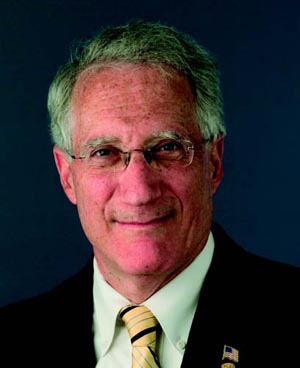LESSONS FROM FUKUSHIMA NEW YORK, NY - America’s nuclear energy industry continues to operate safely and reliably, Marvin Fertel, president and CEO of the Nuclear Energy Institute, told financial analysts and the media at a press conference attended by World-Gen on July 26th. “We certainly believe our existing facilities are safe,” Fertel said. “That doesn’t mean we can’t take lessons learned and won’t take lessons learned from Fukushima and actually enhance safety even better than it is right now. There are improvements that make a lot of sense to us.” The earthquake and tsunami in Japan on March 11th and the nuclear accident at TEPCO’s Fukushima Daiichi nuclear power plant resulted in the worldwide intense interest in nuclear energy safety. The leadership of the US commercial nuclear industry, the Electric Power Research Institute (EPRI), the Institute of Nuclear Power Operations (INPO), and the Nuclear Energy Institute (NEI), with utility executives created a joint leadership model to integrate and coordinate the US nuclear industry’s response to events at the Fukushima Daiichi nuclear energy facility. This ensures that lessons learned are identified and that response actions are effectively coordinated and implemented. |
|
| This is being accomplished while electric companies continue to ensure that the safe and reliable operation of commercial reactors is their highest priority. An integral aspect of the industry’s response is the involvement of the industry’s stakeholders: industry, vendors, architect-engineering companies, industry owners’ groups and national consensus nuclear standards organizations. Fertel provided recommendations made by the independent Nuclear Regulatory Commission’s Fukushima Daiichi task force. The NRC 90 Day Task force reported that: US plants are safe; continued operation and continued licensing activities do not impose an imminent risk to public health and safety; no changes are required for used fuel storage; made no change in emergency planning zones; and issued 34 recommendations. “Because what’s happened at Fukushima is a broad issue, we’ve formed an industry leadership organization which is a coordinated effort to capture and apply lessons that emerge from Fukushima. That’s an important effort for us to do and stay coordinated,” Fertel added. The seven building blocks along with the lead organization(s) are listed: 1. Maintain Focus on Excellence in
Existing Plant Performance (INPO): focus on
continued performance improvement of U.S.
reactors. Other issues require more substantial analysis than has been done—or has even been possible—to date, Fertel cautioned. “Making sure we don’t divert our staffs now from what they should be focused on is also critical. We need to make sure we stay focused on safety right now, not just changing things for the sake of changing things,” he said. The U.S. nuclear energy industry has continued to move ahead with various projects that require NRC oversight, Fertel noted. Since early March, power uprates that improve efficiency and increase a plant’s electric generating capacity have been approved at two facilities, and operating license renewals have been approved for nine of the nation’s 104 reactors. In addition, construction continues to progress in Tennessee, Georgia and South Carolina on new reactors that should begin operating between 2013 and 2019. “Our estimate for the past three years has been that, between 2016 and 2020, we were going to add four to eight new reactors in this country. We believe, pre-Fukushima, that was realistic. We believe, post- Fukushima, that is very realistic. Then, as you move out toward the 2050 time frame, you add a lot more nuclear facilities as you replace power plants that retire and as you meet growing electricity demand,” Fertel concluded. PUBLIC OPINION BEGINS TO RECOVER Mr. Fertel was named senior vice president and chief nuclear officer in 2003. In that role, he was responsible for leading NEI’s programs related to ensuring an effective and safety-focused regulatory process. He directed industrywide efforts to ensure adequate security is provided at nuclear power plants and to address generic technical issues related to commercial nuclear facilities. He also led NEI’s activities related to the long-term management of used nuclear fuel, including achieving success in the U.S. government’s program for the storage and ultimate disposal of used nuclear fuel. |
|
|
|
|
|
|

